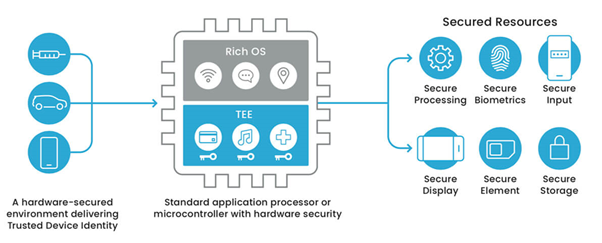Trustonic Secured Platform (TSP™)
Photo Gallery
 |
 |
Trustonic Secured Platform (TSP™)


Additional Info
| Company | Trustonic |
| Website | https://www.trustonic.com/ |
| Company size (employees) | 50 to 99 |
| Type of solution | Hardware |
Overview
TSP is a cybersecurity platform that is integrated at CPU-level during manufacture to provide advanced hardware-backed protection for all kinds of devices – from CPUs and MCUs, smartphones, wearables, healthcare and automotive in-vehicle infotainment (IVI) systems.
It delivers a Trusted Execution Environment (TEE), that protects sensitive data and code from hacking and malware threats by isolating it in a separate and protected area away from the device’s main operating system. Its extensive coverage means manufacturers in multiple verticals are using TSP to achieve total device protection and comply with industry-mandated security requirements:
• Automotive – connected cars rely on diverse systems, some of which control critical functions and therefore require a high degree of trust. TSP protects and secures In-Vehicle Infotainment (IVI) and other embedded automotive systems. It delivers hardware backed IoT security and enables secure updates of applications, eliminating the risk of rogue updates. TSP’s embedded Root of Trust delivers an immutable trusted identity for devices and enables services to be assured that their applications are destined for the correct device.
• Healthcare – TSP is being used by healthcare innovator OPTOLANE to secure its new range of diagnostic devices, used at the point-of-care for early diagnosis and preventative healthcare, particularly for diagnosing cancer, infectious diseases and congenital abnormalities. TSP is securing and ensuring the privacy of patient data extracted, processed, stored and transmitted.
• Wearables – Casio is using TSP to enable enhanced smartwatch features, functionality, speed and ease of use for its new flagship smartwatch, the Casio PRO TREK Smart WSD-F21HR. It is enabling Casio to protect the sensitive tracking and biometric data that is now stored and transmitted by wearables and meet the active lifestyle demands of its customers.
How we are different
• TSP is a scalable mobile security solution that gives 3rd party application developers access to the only open TEE, previously a capability only available to OEM’s own apps. Its benefits reach beyond the factory, by laying the foundation for third-party app developers to deliver secure services that leverage the same strong security/trust capabilities as OEMs. This is possible because Trustonic’s TEE allows installation of trusted applications/services, both at manufacture and over-the-air post-deployment. Developers can access powerful, flexible security capabilities to protect their apps with no additional build of materials, all through a simple, standards based Trustonic Software Development Kit.
• Unlike many hardware platforms, TSP delivers strong security that enhances functionality and future-proofs devices. It enables security-sensitive services to be developed pre and post-manufacture, and utilizes widely-deployed industry standards including Common Criteria and GlobalPlatform. This is enabling wearable manufacturers like Casio to satisfy Google’s Keymaster and verified boot requirements, and future-proof consumer smartwatches by enabling a platform to which new apps/services can be securely updated/added as they become available. TSP also embeds devices with an immutable trusted identity, enabling the identity to be cryptographically proven/ validated throughout its lifecycle.
• TSP’s security capabilities extend to secure peripherals and give access to a Trusted User Interface (TUI) capability on new smartphones. This protects security critical services like biometric authentication, passcode entry and PIN on Glass by isolating data in hardware security. Using a TUI secured by a hardware-based TEE like Trustonic’s is widely regarded as best practice for new mobile Point of Sale (mPOS) implementations, and TSP is enabling payment fintech Rubean AG to bring smartphone mPOS solutions to market. Smartphones as mPOS devices are disrupting payments and delivering many benefits – eliminating costly payment acceptance hardware for merchants, improving staff efficiency for retailers and enhancing the payment experience for consumers.



